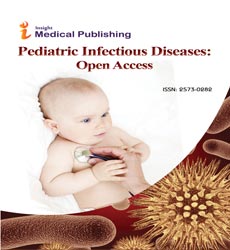Management of Pediatric Infections
Ramasubbareddy D
DOI10.21767/2573-0282.100023
Ramasubbareddy D*
Division of Neonatology, The University of Tennessee Health Science Center, USA
- *Corresponding Author:
- Ramasubbareddy D
Division of Neonatology
The University of Tennessee Health Science Center
USA
E-mail: rdhanire@uthsc.edu
Received date: September 01, 2016; Accepted date: September 02, 2016; Published date: September 06, 2016
Citation: Ramasubbareddy D (2016) Management of Pediatric Infections. Pediatric Infect Dis 1:23. doi: 10.21767/2573-0282.100023
Editor Note
Pediatrics is a branch of medicine which deals with medical care and treatment of infants, children, and adolescents. Skills in pediatric infectious disease treatment and antibiotic management are of critical importance in hospitals.
Pediatric Infectious Diseases: Open Access is a peerreviewed, open access journal that publishes all the relevant topics of pediatric infectious diseases such as blood infections, bone infections, tuberculosis, etc. Articles published in volume No 1, issue No 2 of this journal has proficiently discussed about various infections in children and their preventive measures including treatment.
Santiago-Burruchaga M et al. studied about bronchoscopic abnormalities associated with chronic cough in children. Their studies concluded that airway abnormalities were observed frequently in children and seven out of ten cases would be airway malacia. They also isolated Rhinovirus and Adenovirus in pediatric patients with bronchoscopic infections [1].
Chukwuocha discussed about the role of Presumptive Diagnosis in Malarial Treatment of Children. Author concluded that people from communities where malaria and other infectious diseases are common, should be empowered with suitable policies to control these diseases by themselves [2].
Abusido reported a case of 13 year old boy who emigrated from certain other country to Riyadh with Dengue fever. Author suggested that the health professional’s awareness about the tropical and endemic diseases will help to diagnose and improve different disease conditions in children [3]. Gamboa briefly discussed about the measures to be followed in Bolivia to stop the wide spread measles cases [5].
Katayama meticulously reviewed 15 research articles on Kawasaki disease to assess the non-invasive method of flowmediated dilatation of arterial endothelial function among patients with a History of Kawasaki Disease [4]. De Giacomo et al. reported a case of multifaceted infection of Clostridium difficile in children and Batoui et al. described about the risk factors and etiologies of cerebral palsy in 92 children [6,7].
References
- Santiago-Burruchaga M, Catediano-Sainz E, Zalacain-Jorge R, Vazquez-Cordero C (2006)Bronchoscopic Abnormalities in Pediatric Chronic Cough: A Case-Control Study Pediatric Infectious Diseases: Open Access.
- Chukwuocha (2016) Malaria Treatment in Children Based on Presumptive Diagnosis: A Make or Mar? Pediatric Infectious Diseases: Open Access.
- Abusido (2016) A Passport of Dengue Fever to Riyadh A Case Report of a Boy who Travelled to Riyadh Carrying Dengue Fever. Pediatric Infectious Diseases: Open Access.
- Katayama (2016) Arterial Endothelial Function Assessed by the Non-invasive Method of Flow-Mediated Dilatation in Patients with a History of Kawasaki Disease: A Review of the Literature. Pediatric Infectious Diseases: Open Access.
- Gamboa (2016) Measles Control in Bolivia. Pediatric Infectious Diseases: Open Access.
- De Giacomo, Elena Borali (2016) Clostridium Difficile in Children-A Multifaceted Infection. Pediatric Infectious Diseases: Open Access.
- Batoui S, Habbari K, Hassnaoui M (2016) Etiologies and Risk Factors of Cerebral Palsy in 92 Children (Beni-Mellal, Morroco). Pediatric Infectious Diseases: Open Access.
Open Access Journals
- Aquaculture & Veterinary Science
- Chemistry & Chemical Sciences
- Clinical Sciences
- Engineering
- General Science
- Genetics & Molecular Biology
- Health Care & Nursing
- Immunology & Microbiology
- Materials Science
- Mathematics & Physics
- Medical Sciences
- Neurology & Psychiatry
- Oncology & Cancer Science
- Pharmaceutical Sciences
